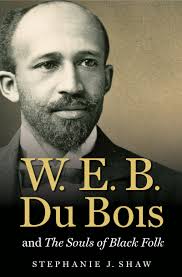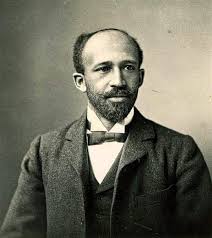The Souls of Black Folk Page #15
The Souls of Black Folk is a 1903 work of American literature by W. E. B. Du Bois. It is a seminal work in the history of sociology and a cornerstone of African-American literature. The book contains several essays on race, some of which the magazine Atlantic Monthly had previously published.
There were the Burkes,—two brown and yellow lads, and a tiny haughty-eyed girl. Fat Reuben’s little chubby girl came, with golden face and old-gold hair, faithful and solemn. ’Thenie was on hand early,—a jolly, ugly, good-hearted girl, who slyly dipped snuff and looked after her little bow-legged brother. When her mother could spare her, ’Tildy came,—a midnight beauty, with starry eyes and tapering limbs; and her brother, correspondingly homely. And then the big boys,—the hulking Lawrences; the lazy Neills, unfathered sons of mother and daughter; Hickman, with a stoop in his shoulders; and the rest. There they sat, nearly thirty of them, on the rough benches, their faces shading from a pale cream to a deep brown, the little feet bare and swinging, the eyes full of expectation, with here and there a twinkle of mischief, and the hands grasping Webster’s blue-black spelling-book. I loved my school, and the fine faith the children had in the wisdom of their teacher was truly marvellous. We read and spelled together, wrote a little, picked flowers, sang, and listened to stories of the world beyond the hill. At times the school would dwindle away, and I would start out. I would visit Mun Eddings, who lived in two very dirty rooms, and ask why little Lugene, whose flaming face seemed ever ablaze with the dark-red hair uncombed, was absent all last week, or why I missed so often the inimitable rags of Mack and Ed. Then the father, who worked Colonel Wheeler’s farm on shares, would tell me how the crops needed the boys; and the thin, slovenly mother, whose face was pretty when washed, assured me that Lugene must mind the baby. “But we’ll start them again next week.” When the Lawrences stopped, I knew that the doubts of the old folks about book-learning had conquered again, and so, toiling up the hill, and getting as far into the cabin as possible, I put Cicero “pro Archia Poeta” into the simplest English with local applications, and usually convinced them—for a week or so. On Friday nights I often went home with some of the children,—sometimes to Doc Burke’s farm. He was a great, loud, thin Black, ever working, and trying to buy the seventy-five acres of hill and dale where he lived; but people said that he would surely fail, and the “white folks would get it all.” His wife was a magnificent Amazon, with saffron face and shining hair, uncorseted and barefooted, and the children were strong and beautiful. They lived in a one-and-a-half-room cabin in the hollow of the farm, near the spring. The front room was full of great fat white beds, scrupulously neat; and there were bad chromos on the walls, and a tired centre-table. In the tiny back kitchen I was often invited to “take out and help” myself to fried chicken and wheat biscuit, “meat” and corn pone, string-beans and berries. At first I used to be a little alarmed at the approach of bedtime in the one lone bedroom, but embarrassment was very deftly avoided. First, all the children nodded and slept, and were stowed away in one great pile of goose feathers; next, the mother and the father discreetly slipped away to the kitchen while I went to bed; then, blowing out the dim light, they retired in the dark. In the morning all were up and away before I thought of awaking. Across the road, where fat Reuben lived, they all went outdoors while the teacher retired, because they did not boast the luxury of a kitchen. I liked to stay with the Dowells, for they had four rooms and plenty of good country fare. Uncle Bird had a small, rough farm, all woods and hills, miles from the big road; but he was full of tales,—he preached now and then,—and with his children, berries, horses, and wheat he was happy and prosperous. Often, to keep the peace, I must go where life was less lovely; for instance, ’Tildy’s mother was incorrigibly dirty, Reuben’s larder was limited seriously, and herds of untamed insects wandered over the Eddingses’ beds. Best of all I loved to go to Josie’s, and sit on the porch, eating peaches, while the mother bustled and talked: how Josie had bought the sewing-machine; how Josie worked at service in winter, but that four dollars a month was “mighty little” wages; how Josie longed to go away to school, but that it “looked like” they never could get far enough ahead to let her; how the crops failed and the well was yet unfinished; and, finally, how “mean” some of the white folks were. For two summers I lived in this little world; it was dull and humdrum. The girls looked at the hill in wistful longing, and the boys fretted and haunted Alexandria. Alexandria was “town,”—a straggling, lazy village of houses, churches, and shops, and an aristocracy of Toms, Dicks, and Captains. Cuddled on the hill to the north was the village of the colored folks, who lived in three- or four-room unpainted cottages, some neat and homelike, and some dirty. The dwellings were scattered rather aimlessly, but they centred about the twin temples of the hamlet, the Methodist, and the Hard-Shell Baptist churches. These, in turn, leaned gingerly on a sad-colored schoolhouse. Hither my little world wended its crooked way on Sunday to meet other worlds, and gossip, and wonder, and make the weekly sacrifice with frenzied priest at the altar of the “old-time religion.” Then the soft melody and mighty cadences of Negro song fluttered and thundered. I have called my tiny community a world, and so its isolation made it; and yet there was among us but a half-awakened common consciousness, sprung from common joy and grief, at burial, birth, or wedding; from a common hardship in poverty, poor land, and low wages; and, above all, from the sight of the Veil that hung between us and Opportunity. All this caused us to think some thoughts together; but these, when ripe for speech, were spoken in various languages. Those whose eyes twenty-five and more years before had seen “the glory of the coming of the Lord,” saw in every present hindrance or help a dark fatalism bound to bring all things right in His own good time. The mass of those to whom slavery was a dim recollection of childhood found the world a puzzling thing: it asked little of them, and they answered with little, and yet it ridiculed their offering. Such a paradox they could not understand, and therefore sank into listless indifference, or shiftlessness, or reckless bravado. There were, however, some—such as Josie, Jim, and Ben—to whom War, Hell, and Slavery were but childhood tales, whose young appetites had been whetted to an edge by school and story and half-awakened thought. Ill could they be content, born without and beyond the World. And their weak wings beat against their barriers,—barriers of caste, of youth, of life; at last, in dangerous moments, against everything that opposed even a whim.
Translation
Translate and read this book in other languages:
Select another language:
- - Select -
- 简体中文 (Chinese - Simplified)
- 繁體中文 (Chinese - Traditional)
- Español (Spanish)
- Esperanto (Esperanto)
- 日本語 (Japanese)
- Português (Portuguese)
- Deutsch (German)
- العربية (Arabic)
- Français (French)
- Русский (Russian)
- ಕನ್ನಡ (Kannada)
- 한국어 (Korean)
- עברית (Hebrew)
- Gaeilge (Irish)
- Українська (Ukrainian)
- اردو (Urdu)
- Magyar (Hungarian)
- मानक हिन्दी (Hindi)
- Indonesia (Indonesian)
- Italiano (Italian)
- தமிழ் (Tamil)
- Türkçe (Turkish)
- తెలుగు (Telugu)
- ภาษาไทย (Thai)
- Tiếng Việt (Vietnamese)
- Čeština (Czech)
- Polski (Polish)
- Bahasa Indonesia (Indonesian)
- Românește (Romanian)
- Nederlands (Dutch)
- Ελληνικά (Greek)
- Latinum (Latin)
- Svenska (Swedish)
- Dansk (Danish)
- Suomi (Finnish)
- فارسی (Persian)
- ייִדיש (Yiddish)
- հայերեն (Armenian)
- Norsk (Norwegian)
- English (English)
Citation
Use the citation below to add this book to your bibliography:
Style:MLAChicagoAPA
"The Souls of Black Folk Books." Literature.com. STANDS4 LLC, 2025. Web. 24 Feb. 2025. <https://www.literature.com/book/the_souls_of_black_folk_310>.








Discuss this The Souls of Black Folk book with the community:
Report Comment
We're doing our best to make sure our content is useful, accurate and safe.
If by any chance you spot an inappropriate comment while navigating through our website please use this form to let us know, and we'll take care of it shortly.
Attachment
You need to be logged in to favorite.
Log In